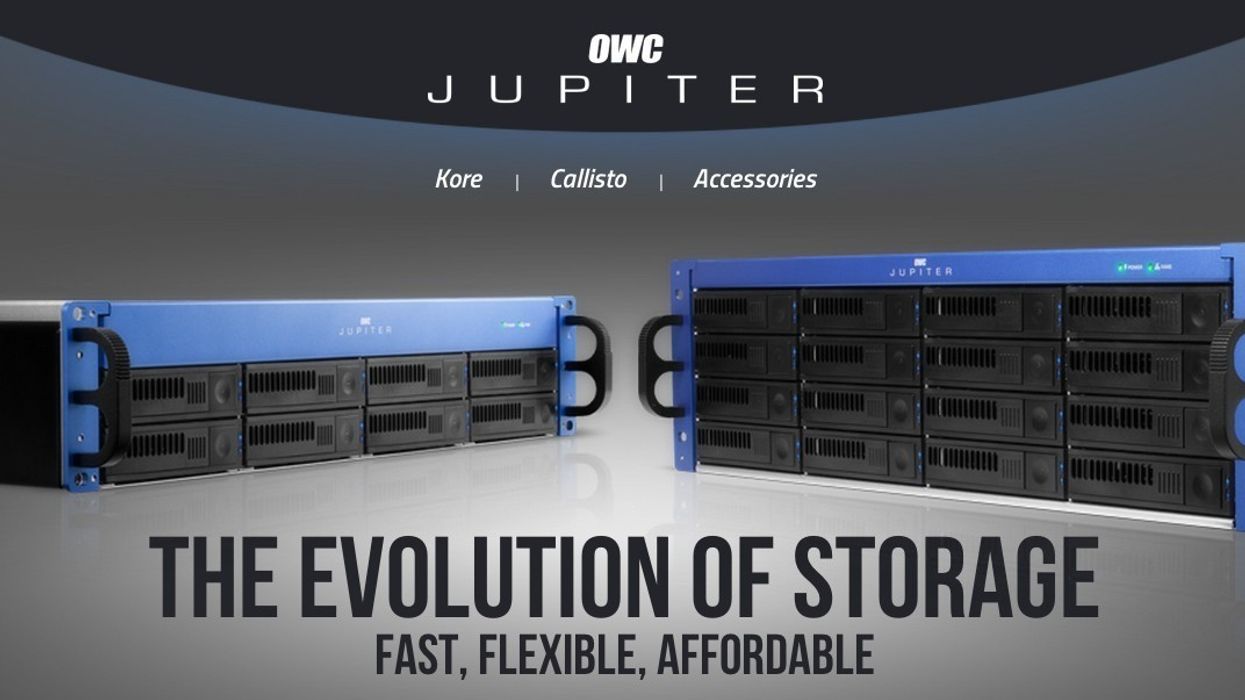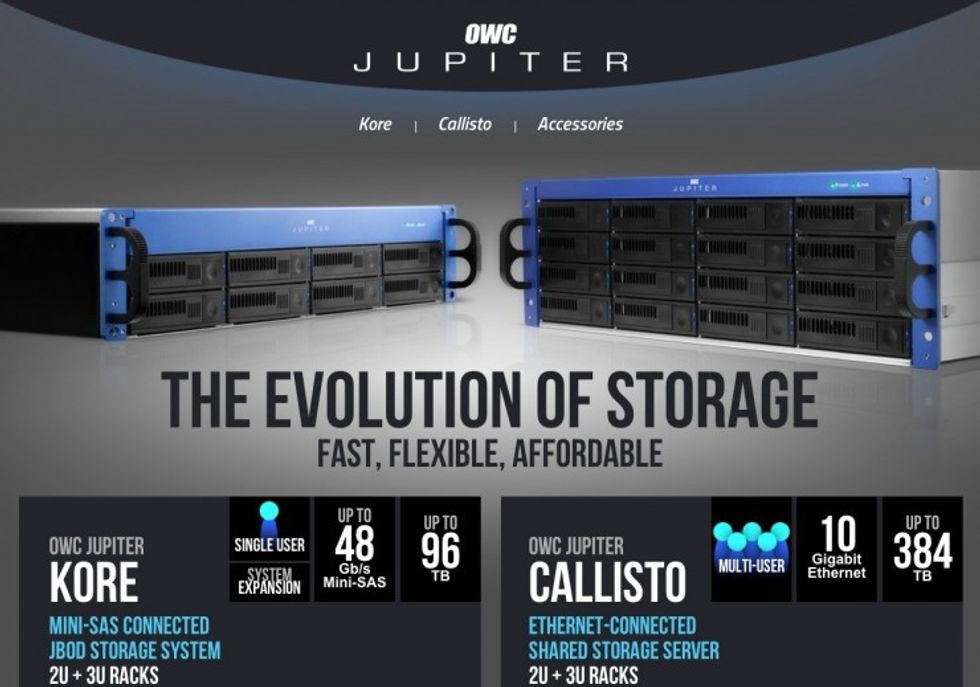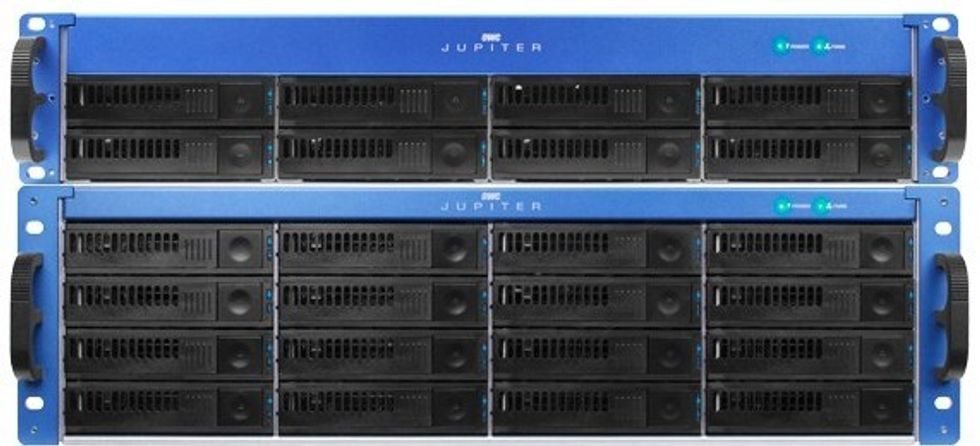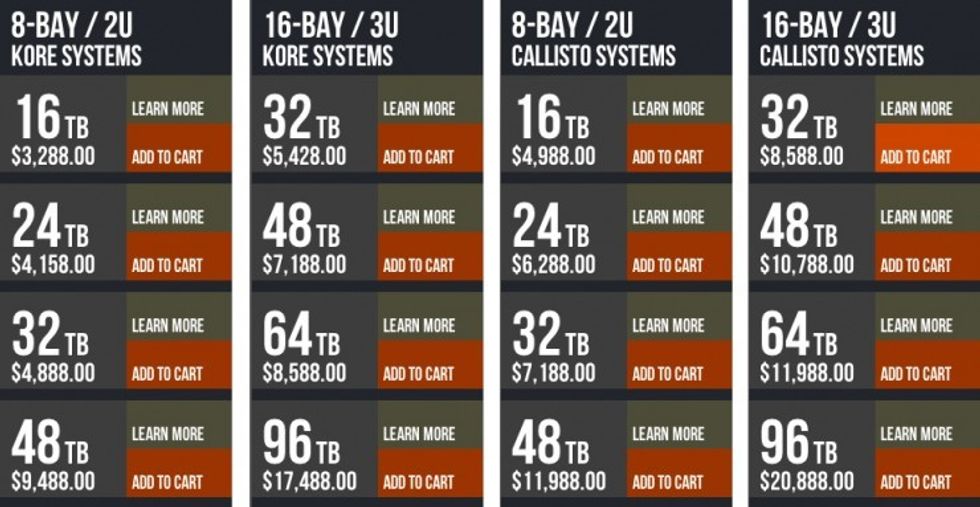Meet the OWC Jupiter Callisto & Kore Storage Units: 'Fast, Flexibile, Affordable' Up to 384 TB

In addition to stocking name brand hardware, Other World Computing also upgrades Macs and manufacturers its own products -- storage of all shapes and sizes included. Around NAB this year, OWC unveiled a serious new family of storage units fittingly dubbed Jupiter. Jupiter Callisto is a scalable NAS/SAN connected via 10Gb Ethernet, while Jupiter Kore either expands Callisto via 24Gb/s mini-SAS or acts as a RAID array via mini-SAS. Jupiter uses ZFS so it is particularly resilient against data corruption -- and it's very customizable and capable of expanding up to 384TB. Check below for more about Jupiter Callisto & Kore.
In addition to its general-purpose applications, OWC has kept video production and post in mind with Jupiter. The video below outlines features beneficial to file-based digital cinema work. It should be noted the video was produced before OWC split Jupiter into the Callisto and Kore lines of units, which is where the 3600TB figure below comes from. In the current conception, the above-quoted 384TB is the maximum per Jupiter 'family,' comprising Callisto as the server with up to 3 Kore(s) providing expanded storage. The other details should still hold true or otherwise translate to presently-possible configurations:
Jupiter Callisto
Jupiter Callisto comes in two handsome rack-mounted variations: a 2U 8-bay model, and a 3U 16-bay model. It is equipped with a quad-core Intel Xeon E5-2603 vs2 1.80GHz processor, two possible 10Gb Ethernet ports, two 24Gb/s mini-SAS ports, and two USB 2.0 ports. Callisto's 10GbE uses the 10GBASE-T standard, so Callisto can connect via standard Cat 6 cable with 8P8C (aka RJ-45) connectors. You'll need Cat 6a or Cat 7 for longer lengths, but copper cabling with standard connectors means you get the benefits of 10GbE while keeping costs relatively low, as OWC says, without the need for costly SFP+ transceivers. The Ethernet ports are also backwards-compatible with 1GbE cables, so 10GbE isn't required for interfacing Callisto.
Mac users trying to tap the full capacity of 10GbE, however, will have to bypass their machine's built-in Ethernet port and go for a PCIe-based solution. For example OWC recommends their dual-PCIe slot, dual-Thunderbolt 2 port expansion chassis, the Helios 2, outfitted with an ATTO 10GbE adapter card. With another Ethernet port to spare, Callisto could be jacked into a 10GbE switch for simultaneous multi-user access. Or, both Ethernet ports can be linked to a dual-port 10GBASE-T card, like this one, and bonded for full 20Gb/s access. Any Kore units added to Callisto would function as further storage for a Jupiter system, accessible to connected users as a unified volume. One 16-bay Callisto can store up to 96TB on its own before any additional units are added.
Jupiter Kore
Jupiter Kore acts as a RAID-ready JBOB system. Without tethering to an existing system such as Callisto, Kore requires a RAID controller / SAS adapter -- once again we're talking PCIe. In such a case, however, a standalone Kore can link up via 'dual direct' mini-SAS for 48Gb/s of connectivity (albeit limited by Thunderbolt in an expansion chassis scenario). Alternatively, up to three Kores can be added to Callisto. Kore also comes in 8-bay 2U or 16-bay 3U models, with a 16-bay unit able to store up to 96TB. This means Kore can add up to 288TB (3 x 96TB) to one 96TB Callisto, for a Jupiter system with a total 384TB of storage.
As with Callisto, all Kore drives are 7200RPM enterprise HDDs connected via 6Gb/s SAS interfaces. Both Kore and Callisto have a redundant, load-balancing power supply with the ability to hot-swap to ensure uptime.
Astronomical Storage for Terrestrial Beings
Here's how the pre-configured builds break down in terms of price (to actually 'learn more' or 'add to cart,' see links below):
OWC also offers 1-on-1 services for building custom systems. You could go for, say, a 16TB 3U Callisto with faster drives -- though when I asked about this, OWC said there wasn't a big need for 10,000RPM drives thanks to Callisto's caching system. And, as with any system like this, you always have the option of upgrading storage by swapping-out drives in the future (after warranty). Ultimately there are many factors to weigh in the storage mass/fast/price triangle, but Jupiter may certainly be an option for indies or small production houses.
Bob Boldt, Account Manager for OWC, was extremely receptive to my (many) questions, and told me you guys can send any questions you may have his way as well. You can email him at bboldt@macsales.com, or email jupiter@macsales.com if you're interested in a custom Jupiter system.
Links:
- OWC Jupiter Callisto & Kore -- Product Homepage
- See Jupiter Family’s Newest Addition, Callisto At NAB -- OWC Blog
















